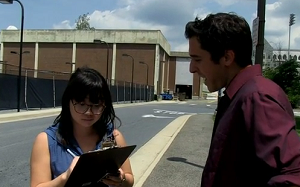In The Legislature, A Debate Over Direct Democracy Versus Representative Democracy

Today the House Judiciary Committee played host to a packed room full of people testifying on HCR3011 which would, if passed by the legislature and approved by voters, amend the state constitution to put some limits on the initiated measure process.
Here are the changes proposed:
* Measures with more than a $20 million fiscal impact can only be approved on general election ballots, not the June primary ballots.
* Petition circulators cannot be paid at all.
* The total amount of signatures required must include at least 3% of the resident population from 50% of the state’s counties for changes to statue, and 4% for constitutional amendments.
This is just one of several proposals intended to change the initiated measure process in the wake of rampant signature fraud involving two measures and a group of NDSU football players.
Another amendment, SCR4006, has already been passed by the Senate. That one would require that measures with a more than $50 million impact be subjected to a legislative vote. If more than 60% of legislators vote against the measure approved by the voters, it fails.
For obvious reasons, these proposals and others have set off a lot of debate. Many of my conservatives friends tell me that this is an assault on their 1st amendment rights. But what’s really going on is a debate about two different forms of democracy – direct democracy versus representative democracy – and it’s one our founders had at the dawn of our nation.
“A pure democracy, by which I mean a society consisting of a small number of citizens, who assemble and administer the government in person, can admit no cure for the mischiefs of faction,” wrote James Madison in the Federalist papers. “A common passion or interest will be felt by a majority, and there is nothing to check the inducements to sacrifice the weaker party. Hence it is, that democracies have ever been found incompatible with personal security or the rights of property; and have, in general, been as short in their lives as they have been violent in their deaths.”
What Madison was afraid of was the rights of the individuals being tramped by mob rule. And really, that’s what direct democracy is. Governance through the rule of the mob.
Don’t get me wrong, voters should have an outlet through which they can take governance into their own hands. The question is, how easy should that process be?
The bar is set pretty low in North Dakota right now, and I’m not so sure the process shouldn’t be a bit more arduous. And subjected to legislative scrutiny. We can all say cynical things about the politicians we elect to represent us, but more often than not policy produced by elected officials through the legislative process is going to be superior to that enacted through popular vote.
I think changing the law should be a difficult process. I wrote earlier this week about the growth in the size of North Dakota’s code of laws since territorial days. We’d all be served well by slowing the process down a little bit. That’s what this amendment does for the initiated measure process, and my only criticism is that we ought to amend the legislative process to require super-majority votes to pass all laws.
If we’re going to establish policy we all have to live under, what’s wrong about an arduous and lengthy process that requires broad consensus before said policy is established?







